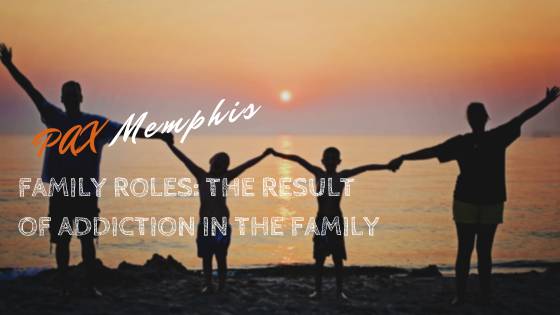The disease of addiction not only affects the user but the entire family unit as well. Whether your loved one is addicted to food, heroin, alcohol, marijuana, chaos, or even codependency – everyone within the family dynamic is affected. Addiction can be loud, quiet, obvious, or even hidden. No matter what the addiction looks like, each family member naturally takes on a specific role in attempts to cultivate structure, predictability, and a sense of “normalcy”.
Living in the chaos of your loved one’s addiction often leads to each member of the family adopting coping mechanisms that ultimately create unhealthy family roles in the wake of addiction.
The Addict
This individual is the center of attention and the center of chaos within the family unit. Most discussions, decisions, and energy revolve around this person. The individual who is addicted copes with difficult feelings by abusing substances. As a direct result, this individual will lie, cheat, steal, and manipulate everyone around them. In addition, this individual tends to isolate and often reacts erratically. These individuals cannot focus or think rationally without achieving his/her next high. It is no surprise that family members adopt unhealthy roles in the wake of drug or alcohol addiction.
The Hero
The family hero generally fits the Type A personality category – hard-working, overachieving, perfectionist. This individual will feel an added pressure to create a sense of normalcy through his/her own accomplishments. More often than not, the family hero feels it is their responsibility to rescue the family from the shame of addiction. They may also obsess over making sure everything looks good on the outside. The hero often maintains the appearance that they are balanced, but these individuals tend to suffer from anxiety and stress-related illnesses as he/she is often isolated and hurt.
The Enabler
The enabler of the family lives in total denial. This individual seeks to be the peacemaker within the family unit by attempting to smooth things over. Furthermore, the enabler will convince themselves that their addicted loved one is not struggling with drugs and alcohol, in attempts to “protect” the family. Oftentimes, this individual will make excuses for their loved one to make light of a serious situation, with the hopes of maintaining peace. The enabler is consumed with caretaking for the addict (financially, emotionally, physically, etc) and is typically unavailable for other members of the family. This role fulfills a temporary solution to a serious problem. The enabler will often unintentionally exacerbate the issues because he/she does not know how to let go and establish healthy, potentially life-saving boundaries. Consequently, this individual often feels inadequate, fearful, and helpless.
The Scapegoat
The family scapegoat is the person who takes the brunt of the blame for the entire family’s problems. This individual is usually taken on by the second oldest child. Typically, he/she offers the family a sense of purpose by assuming the role of someone else to blame. This individual is often outspoken and receives the family’s collective anger while shielding the addicted individual from blame and resentment. As the scapegoat gets older, this individual usually gains more resentment. Then, he/she tends to act out in violence, promiscuity, and many other erratic behaviors.
The Mascot
The family role of the mascot is similar to your average “class clown”. This individual deflects stress and negative emotions by supplying humor. The mascot wants to bury the painful truth of addiction and uses humor to achieve the desired effect. Often times the mascot is fragile, vulnerable, and desperate for the approval of others. Therefore, by providing comic relief, the mascot defends himself against pain and fear. Family mascots often develop substance use disorders as well, further perpetuating the vicious cycle of addiction.
The Lost Child
The lost child often displays shy, withdrawn, emotionally checked out tendencies. This individual cares deeply but tends to isolate to avoid being an additional burden to the family unit. This particular family member is not always a child. It can be a husband, sister, etc. The lost child is careful to avoid any confrontation as they are often low-key and neglectful of their personal needs. This individual puts off making decisions, struggles to form intimate relationships, and often chooses to spend time in isolation as a way to avoid conflict and cope with unwarranted feelings.
Establishing Healthy Roles Through Family Therapy
Addiction treatment should involve the entire family as one unit. After all, the disease of addiction affects every member of the family. Family therapy is the suggested approach to addressing the individual needs for the healing of each family member. Many times, these familial roles are unhealthy coping mechanisms for people who are not struggling with addictive behaviors. These individuals often feel a desire for change.
Family therapy can help family members learn two vital mentalities when facing the addiction of a loved one.
- If you are consumed with all of the desperation and willingness for your loved one to change, you leave nothing for the addict to hold for themselves.
- If your happiness is dependent upon the hopes of your addicted loved one engaging in a successful recovery, you are adding an extreme amount of pressure for the individual seeking sobriety. The added pressure of “letting family members down” can contribute to your loved one avoid treatment.
If your loved one is struggling with addiction, it is always wise to seek support. There are many local, free organizations as well as family-involved addiction treatment centers that can offer help and professional resources during this despairing time. You may not be able to control the outcome of your loved one’s addiction, but you can make changes within your family dynamics.
Medically Reviewed: September 25, 2019

All of the information on this page has been reviewed and verified by a certified addiction professional.










